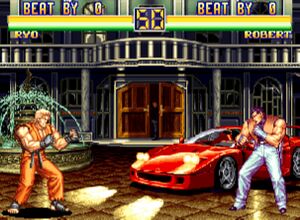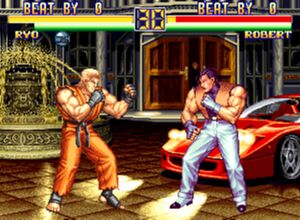-Happy New Year 2025!
Art of Fighting 2/System
HUD


Character Name: Self-explanatory.
Win Points: An orb flashing WIN appears once a fighter has won a round.
Strength Gauge (aka Life Bar): Shows the amount of strength the fighter has left before he is knocked-out. Every time your character gets hit or blocks special attacks, this gauge gradually depletes. In Story Mode, strength can be increased via the Strength Training bonus game. Strength is at maximum amount in Versus Mode.
Spirit Gauge (aka Spirit Meter): Shows the amount of spirit the fighter has currently available. As the character uses special moves, this gauge depletes from green to yellow, then yellow to red. The remaining length of the gauge is proportional to the power of the character's special moves. In Story Mode, spirit can be increased via the Spirit Training bonus game. Spirit is at maximum amount in Versus Mode.
Player Score: Shows the player's accumulated points and versus standing.
Time Count: Shows how much time is left in the round. Maximum time is 60 at default settings.
"Beat By": The number of opponents you have beaten in versus mode.
Single Player Mode
A one player game pits you against a series of formidable CPU-controlled opponents. You can select from the new roster of 12 characters, consisting of characters from the first Art of Fighting as well as new ones. You also have a chance to pick your first opponent (except from Mr. Big), after which there is a preset order of opponents after beating the first match. After beating the first eleven fighters, you have to fight the main boss, Mr. Big. Defeating Big earns you your character's ending, unless you achieved a certain requirement, which then brings you to a Special Stage against the mastermind, the corrupt police commissioner Geese Howard. To reach Geese, you must go through the game without losing a single round in any match. This will unlock a special cutscene for your character and lead you to the Special Stage. Defeat Geese in order to get your character's ending.
Single Player Bonus Games
During a single player game, you have 3 chances to try the bonus stages, one given for every 3 matches. You are given a task to complete within a given time limit for a certain reward. They are as follow:
SPIRIT TRAINING
There will be a red gauge with a fast moving yellow bar between MIN and MAX power. You must befall the entire tree in a single blow. To do this, you must time to hit the A button once the yellow bar is at least 95 to 100% MAX. If successful, the player gains an extra amount of spirit for the rest of the game. The training fails if the tree does not completely break (and apples will fall on the ground). You have 10 seconds to complete the bonus game.
STRENGTH TRAINING
There will be a counter at the top of the screen. You must defeat all the thugs within the time limit. These thugs have a fairly short amount of life, so don't use special moves and use normal attacks instead. If successful, the player gains an extra amount of strength for the rest of the game. Failure to beat all the goons after the time has elapsed awards the player nothing. You have 20 seconds to complete the bonus game.
INITIATE SUPER DEATH BLOW (aka Unlocking Your Chosen Character’s Super)
There will be a training dummy for you to destroy. However, only your character's unique Super Death Blow (your chosen character’s Super) is usable. To do this, input the command displayed at the bottom of the screen. Perform the Super Death Blow (your chosen character’s Super) a certain number of times to destroy the dummy. If successful, the player learns the move for the rest of the game, given he has enough spirit to do so. Failure to destroy the dummy awards the player nothing. Once learned, you cannot select this training in future bonus games. Furthermore, selecting this training late in the game requires you to perform more moves to destroy the dummy. You have 25 seconds to complete the bonus game.
Versus Mode
A second player may jump into battle at anytime by pressing the Start button. A screen will appear, indicating that a new challenger has entered play, at which time the new player selects their character and a new match begins. If the challenger loses, the winner returns to where his or her match was interrupted in Story Mode. For a winning challenger, they proceed to the Story Mode themselves.
System Basics
To begin game play, each player hits their respective Start buttons. On the next screen, select your character by highlighting their portrait and pressing a button. Each button has its own specific palette for each character.
Each match consists of 3 rounds. The fighter who wins 2 out of 3 rounds first is declared the winner.
If neither fighter is knocked out and the time limit is reached, the fighter with the most Strength wins the round. If Strength is equal, neither fighter will be awarded a win.
In Versus Mode, each fighter begins with maximum possible Strength and Spirit points. When a fighter loses all their Strength points, the fighter is knocked out (K.O.) and loses the round.
In Story Mode, the player begins with less Strength and Spirit points which can be further increased via training in bonus games.
As you use special moves, your Spirit Gauge decreases, and you must charge it during the round to refill it. The Spirit Gauge is refilled between rounds.
(Pro Tip: Use C to charge as it will start charging quicker than A or B)
In single-player mode only, all of the characters’ supers in AOF2 must be learned from the bonus game first before they can be used. Enough spirit is also required, no matter if you are playing Story Mode or Versus Mode.
Spirit: Every special move consumes a certain amount of Spirit on use, represented by the green bar below your health. When you only have below 50% of your Spirit left, the bar turns yellow, and below 25%, it turns red. Below 50% Spirit, special moves may deal less damage, and below 25% Spirit, they may also gain worse properties. Super Moves and Desperation Moves are completely unusable below 75% Spirit.
You can refill your Spirit by holding A, B, or C until your character enters a unique animation. This rapidly refills Spirit. It is recommended that you hold C to recharge, as due to how heavy attacks are input, C will begin looking for charges quicker. Spirit also refills in the background at a rate of .018% per frame for every frame you are on the ground and not currently in the animation for a special move.
Desperation Moves: Desperation Moves are unique supers which cannot be used unless you are below 20% health. They cost 75% Spirit to use and cannot be used if you are below this threshold. They are universally unblockable, with the exception of John's.
System Minutia
Burnout: There is a hidden burnout counter that increases by 1 every time you perform any attack, and decreases by 1 roughly once every 2 to 3 seconds. If the counter reaches 17, you enter burnout. In this state, after you recover from an attack, you will not be able to block, walk, dash, or backdash for 12 frames after recovery. You can, however, perform any other action. This debuff lasts the remainder of the round.
Variable Wakeup / Throw Recovery: The amount of time it takes to recover from a throw varies significantly per character, and Jack has a uniquely long wakeup animation. The below table details the wakeup time and throw tech time of each character, both defined in frames between the first frame the character hits the floor and the frame they are actionable.
| Character | Wakeup time | Throw tech time |
|---|---|---|
| Eiji | 37f | 56f |
| Jack | 69f | 60f |
| John | 37f | 42f |
| King | 37f | 34f |
| Lee | 37f | 51f |
| Mickey | 37f | 45f |
| Mr. Big | 37f | 41f |
| Robert | 37f | 66f |
| Ryo | 37f | 71f |
| Takuma | 37f | 71f |
| Temjin | 37f | 64f |
| Yuri | 37f | 55f |
All frame data displayed in character pages was tested against Ryo.